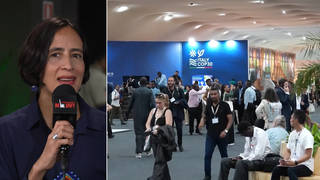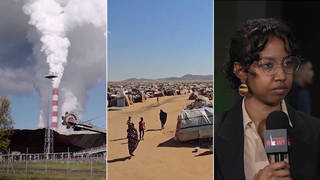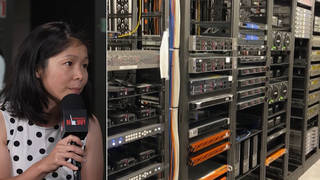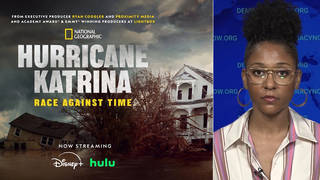
Topics
New Orleans held its first election after the Hurricane Katrina disaster on Saturday. Mayor Ray Nagin and Lieutenant Governor Mitch Landrieu won the two top spots and will face each other in a run-off in May. Tens of thousands of displaced residents were no allowed to vote. We speak with Ted Shaw of the NAACP Legal Defense and Education Fund. [includes rush transcript]
On Saturday, New Orleans held its first election after the Hurricane Katrina disaster. Mayor Ray Nagin and Lieutenant Governor Mitch Landrieu won the two top spots and will face each other in a run-off in May. The race pitted 22 candidates against each other and brought national scrutiny on the shifting racial dynamics of the city. Because many African-Americans still have not been able to return to New Orleans, the city faces the possibility of a white mayor for the first time in almost 30 years. The last white mayor was Lieutenant Governor Landrieu’s father, Moon Landrieu who left office in 1978.
Thirty-six percent of the city’s 297,000 eligible voters participated in the election. Mayor Nagin received 38% of the vote while Landrieu had 29% of the vote. According to an analysis of demographic data by GCR & Associates, Nagin received 65 % or more of the vote in predominately black neighborhoods. This is almost a complete reversal from four years ago, when he received most of his support from white voters. More than 20,000 voters cast ballots early by mail, fax or at satellite voting stations around the state. Displaced citizens were not allowed to vote by satellite if they were staying outside of Louisiana.
- Ted Shaw, is Director-Counsel and President of the NAACP Legal Defense and Educational Fund.
Transcript
AMY GOODMAN: Here to talk more about the election in New Orleans is Ted Shaw, the Director-Counsel and President of the NAACP Legal Defense and Education Fund. Welcome to Democracy Now!, Ted Shaw.
TED SHAW: Thank you, Amy.
AMY GOODMAN: It’s good to have you with us. Your assessment of this election?
TED SHAW: Well, we at the Legal Defense Fund, and we’ve been working in concert with a constellation of civil and human rights organizations, we have mixed feelings about the election. We have mixed feelings, because there’s still a lot of people who are eligible to vote, who wanted to vote, but were unable to vote, because the state and the federal court did not go as far as we thought they should have gone in ordering some of the extraordinary measures necessary to make sure that the extraordinary conditions created by Katrina were ameliorated.
So, for example, we wanted out-of-state polling places. We didn’t get that. We got in-state polling places, but a lot of people were still confused about that. They thought they could show up on election day and vote in some of the satellite polling places outside of New Orleans. Those, in fact, were only eligible or available for early voters, and that ended before Saturday, of course.
But having said that, there were thousands of people who probably wouldn’t have been able to vote but for the efforts of the civil and human rights organizations and activists to get the state to take on some of the measures they did take on, there were people who were bused in from Atlanta, people who came from Houston, from all over Louisiana, to vote. There were people who really, for them, this was their way of saying that we are still New Orleanians, and we have a stake in the city, and we want to return.
The organizations, like the Legal Defense Fund, that worked on this are very clear that their interests were nonpartisan interests, and so our interests were in just making sure that as many people were eligible to vote as possible. Ordinarily in a New Orleans election you don’t have extraordinarily high voter turnout anyway. 140,000 people would be commonplace. And here, it’s estimated so far, though I think we have to wait for the numbers to come in more clearly, it’s estimated that there were about 108,000 people who may have voted. But that leaves about 30,000 people, 32,000 people, lower than the ordinary turnout.
AMY GOODMAN: So, they’re saying about a little over a third of the people voted?
TED SHAW: Well, that’s right. But also, I think that the difference between the ordinary turnout, and the turnout here really isn’t the measure, because I think many more people wanted to vote in this extraordinary circumstances. People were more electrified about exercising their right, so there’s, as you know, the runoff election on May 20, and our concern now is to make sure that people still get the information they need, some of the things that could have been done better, both with respect to the mega-sites where there were long lines of people and some confusion.
JUAN GONZALEZ: That’s one of the things I wanted to ask you. What’s your sense of the process itself? Were there especially heavy challenges to voters, or were they much more lenient in terms of the challenge situation? What were the lines like? In other words, the mechanism of the process itself.
TED SHAW: Well, it varied from polling place to polling place. There were — some of the polling places that I just mentioned were larger than others, and there you had longer lines, some confusion. But we don’t have any report so far of really malfeasance going on. You know, I think more we were concerned about and are concerned about the confusion and the failure of the state to take on some of the other measures that could have been taken on. On election day itself, you know, there were a lot of people monitoring these elections, and so far, we are unaware of any issues that would give rise to concerns about malfeasance.
AMY GOODMAN: When Reverend Jesse Jackson, Al Sharpton other activists had a big rally in New Orleans, they were saying here Iraqis can vote for the elections. U.S. makes sure to prove the legitimacy of the elections in Iraq, that Iraqis here could vote, has set up satellite voting. And yet, here in this country they couldn’t set up satellite voting outside of Louisiana for New Orleans for perhaps the most important mayoral race in the history of New Orleans, because it will determine the future of this decimated city.
TED SHAW: Well, that’s right. And I was down there for that march and have been down there a number of times. And we actually litigated that issue before the federal court, before the march, and made that same point with the federal judge. And the federal judge, Ivan Lemelle, did not conclude that he had the ability or the inclination to order out-of-state polling places. I think —
AMY GOODMAN: What was his argument?
TED SHAW: Well, his argument was as an African American who grew up in New Orleans, he believed that he was going to do what he needed to vote, and he thought that people needed to do it, period, you know, come back to New Orleans to vote. But also, I think he did not see legal authority to order out-of-state polling places. Our view was that, look, this is an extraordinary circumstance. Put some pressure on the federal government and on the state to do it. It doesn’t take a whole lot of money or effort to actually set up a polling place itself. And it could have been done in places like Houston and Atlanta, where there are large numbers of people who have been displaced. And the point that you just referred to is a powerful one that we have all been drilling on, which is that if we could have out-of-nation polling places for Iraqis living in the United States, we certainly should have had it for people displaced by Katrina living within the United States. Democracy should begin at home.
AMY GOODMAN: We are talking to Ted Shaw, Director-Counsel and President of the NAACP Legal Defense and Education Fund. We’re going to go to break. When we come back, also going to go to a FEMA-run trailer camp in Baton Rouge that we tried to speak to some of the residents in just earlier this month, and we’re — well, you could say, ridden out of town.
[break]
AMY GOODMAN: Our guest is Ted Shaw, head of the NAACP Legal Defense and Educational Fund. Juan?
JUAN GONZALEZ: Ted, I would like to ask you, I know you are a nonpartisan group and you don’t take sides in any kind of political issues, but I’m just interested in your take on this change of support for Ray Nagin, because some of the articles I have seen are making it seem that this is basically a racial matter, when it seems to me that there could be a real concern among the voters of New Orleans about how Nagin performed in the situation in which he was under. And I’m especially concerned about this shifting of the vote from a largely white support that he got last time to largely African American support this time. Any thoughts about what might be happening there?
TED SHAW: Well, of course, there are a lot of thoughts about what’s happening there. Look, we have been — meaning the Legal Defense Fund — we have been in Louisiana for a long time litigating cases. We litigated the case that produced the Congressional District that elected the only African American in Congress from Louisiana right now, Bill Jefferson. Racially polarized voting has been around in New Orleans for a long time.
Nagin was a candidate of the white business community. He made the statements about “chocolate city.” He has lost a lot of white support. But New Orleans is being remade, in the eyes of some, as a kind of white city that is Disney-fied and in which black folks have been displaced, except those who are going to be there to be the cultural attraction for New Orleans. We believe that everybody should have the right to vote, the right return, no matter if they are black or poor, rich or white, etc. And the voters should sort all this out. Racially polarized voting has been a long old reality in New Orleans. We want everybody to have the right to vote. Let them sort all that out.
AMY GOODMAN: Ted Shaw, thank you for being with us. The mayoral runoff race will be May 20.












Media Options